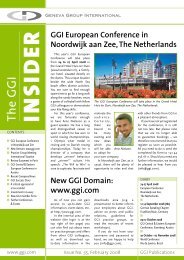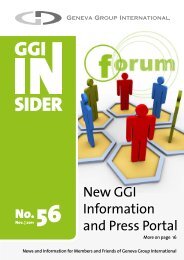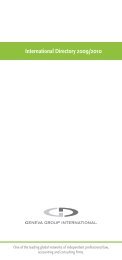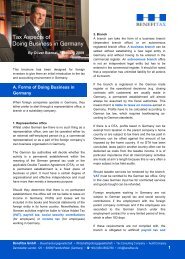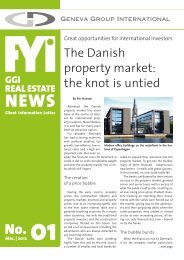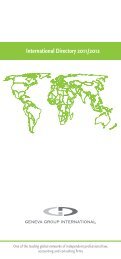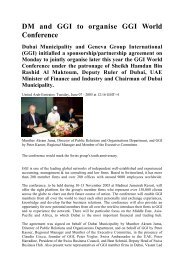I N S I D E R - Geneva Group International
I N S I D E R - Geneva Group International
I N S I D E R - Geneva Group International
Create successful ePaper yourself
Turn your PDF publications into a flip-book with our unique Google optimized e-Paper software.
I N S I D E R<br />
CONTENTS<br />
Conference in Ireland<br />
***<br />
Easymeet<br />
***<br />
Success Stories<br />
***<br />
Offshore Investment<br />
Funds in Panama<br />
***<br />
CFR Network<br />
***<br />
New Members<br />
***<br />
Further Conferences<br />
and events<br />
DIARY<br />
11-14 May 2006<br />
European Conference<br />
Killarney, Ireland<br />
***<br />
01- 04 June 2006<br />
Latin American<br />
Conference<br />
Caracas, Venezuela<br />
***<br />
November 2006<br />
World Conference<br />
New York, USA<br />
GGI EUROPEAN CONFERENCE IN IRELAND,<br />
11-14 MAY 2006<br />
Pat Cox<br />
www.genevagroup.net<br />
Issue No. 28<br />
February 2006<br />
Hosted by O´Flynn Exhams the forthcoming<br />
GGI European Conference in Killarney,<br />
Ireland promises to become a spectacular<br />
event. Pat Cox has agreed to give a<br />
Keynote address on Saturday morning. He<br />
was a most successful (and very recent)<br />
President of the European Parliament<br />
and is an exceptional speaker. He is also a<br />
main Board Director of Michelin among<br />
other appointments.<br />
You have received the invitation with an<br />
application form. Please register at your<br />
earliest convenience If you need any further<br />
information, please contact Annina Huber<br />
on +41 44 256 18 18 or by Email at<br />
huber@genevagroup.net.<br />
EASYMEET – MINI MEETINGS FOR LAWYERS<br />
One of the pillars of the success of <strong>Geneva</strong> <strong>Group</strong> <strong>International</strong> has<br />
always been the personal contact between the different member firms.<br />
The exchange of professional experience and the continuing<br />
professional education are crucial for the execution of demanding<br />
mandates. Sometimes it is not possible for younger lawyers to attend<br />
our Conferences. Easymeet shall therefore be a cost efficient way to tie<br />
up with other members, to enhance the professional skills and to focus<br />
on chosen topics related to international law.<br />
Raimund Walch, Wendler Tremml, Floor Wertenbroek, Van Leeuwen<br />
Van Der Eerden and David Bloom, RoiterZucker have invented the<br />
new concept for “Easymeet, the Mini Meetings for lawyers in Europe”.<br />
The first meeting will take place in Berlin from 31 March to 2 April<br />
2006 and is hosted by Wendler Tremml Rechtsanwälte. If you need<br />
any further information please contact Raimund Walch at<br />
RWalch@law-wt.de or Annina Huber on huber@genevagroup.net.<br />
GGI Conference in Caracas<br />
Please note the amended date for the Latin American Conference in<br />
Caracas. The conference will take place now from June 01 until 04,<br />
2006.
Issue No. 28, February 2006 Page 2<br />
SUCCESS STORIES<br />
NEW EDITION OF “KEY ASPECTS OF GERMAN BUSINESS LAW”<br />
This book is the third edition of the well received Key Aspects of German Business<br />
Law.<br />
Due to the great number of changes in the German Civil Code and Tax Law, this<br />
edition is a particularly important and useful tool for those entering the German and<br />
European Union market.<br />
The book presents a clear and precise overview. It was written by attorneys<br />
involved in the daily practice of business law in Germany and the European Union,<br />
and is aimed at people who wish to orient themselves quickly with the German<br />
legal system and the manner in which it impacts business purchases,<br />
establishment, operations and liquidations.<br />
In all sections special attention has been paid to highlighting and explaining the differences between<br />
the German legal system and that of the United States.<br />
Though the intention is to provide information that will prove valuable to all foreigners, particularly<br />
business people and lawyers advising clients with an interest in doing business in Germany.<br />
GGI Members can order the new edition of „Key Aspects of German Business Law“ directly at<br />
Wendler Tremml, Martiusstr. 5, 80802 Munich, Tel. +49 89 38 89 90, Email: munich@law-wt.de<br />
for a special price of only € 30.-<br />
GGI MEMBER FIRM PRAXISLAW, BRUSSELS – INSURANCE LAW<br />
FIRM OF THE YEAR<br />
Praxislaw has been elected Insurance Law Firm of the year by a jury of prominent and reputable<br />
professionals at the first edition of the Belgian Legal Awards, an organisation under the patronage<br />
of the Minister of Justice and the President of the European Commission and with the support of<br />
first rate sponsors.<br />
The Award was presented to Mr Philippe Grégoire, senior partner at Praxislaw, by Mr Guy Keutgen,<br />
former Secretary General of the FEB/VBO (the Federation of Enterprises in Belgium), Professor of<br />
Law (UCL) during a ceremony held on 6th February 2006.
Issue No. 28, February 2006 Page 3<br />
GGI MEMBER IVAN SIMIC HAS BEEN APPOINTED AS ACTING<br />
DIRECTOR OF THE TAX ADMINISTRATION OF THE REPUBLIC OF SLOVENIA<br />
PORTRAIT – AN EXPERIENCED TAX EXPERT<br />
Ivan Simič, a 46-year old lawyer who was born<br />
in Murska Sobota, is a man of action who does<br />
what he says. When he decided a while ago to<br />
do something for his own sake, he lost 20<br />
pounds in three months and he has since kept<br />
his new shape. This year he bought himself a<br />
bicycle, trained for two months and then in just<br />
six days crossed the whole of Slovenia visiting<br />
all tax offices. He missed out on being a<br />
candidate for President of the Football<br />
Association of Slovenia although he is still<br />
President of the Inter-municipal Football<br />
Association of Ljubljana.<br />
He has never hidden his ambitions. After<br />
finishing Aviation High School in Mostar and<br />
graduating from the Faculty of Law in<br />
Ljubljana, in 1986 he enrolled at the Faculty of<br />
Sport, passed all his exams except one and<br />
then for two years fought against drugs and<br />
smuggling as a criminal investigator.<br />
Simič has 20 years of work experience,<br />
choosing tax consulting as a profession in<br />
which he mainly acted as some sort of<br />
opposition.<br />
Ljubljana – The Government has appointed Ivan Simič<br />
as acting Director of the Tax Administration of the<br />
Republic of Slovenia (DURS) and recalled Zvezdana<br />
Geržina. Simič will assume duties as the key figure of<br />
Slovenian taxation on 1 January, 2006.<br />
On the appointment of Mr Simič, Minister of Finance<br />
Andrej Bajuk, who has proposed several changes to the<br />
top of the Tax Administration, said he is both glad and<br />
satisfied: ‘Someone with his experience can significantly<br />
contribute to a simplified system and to a more user-<br />
friendly Tax Administration’.<br />
Upon his appointment, Simič was a man of few words. Next month he is set to meet his team and<br />
to be briefed on current events, so only then can we expect any new action. ‘I am going to<br />
implement the legislation and collect the correct amount of tax’, Simič announced.<br />
He wanted to co-operate pro-actively in<br />
adopting the tax reform but he usually could<br />
only present his proposals as a tax advisor,<br />
and more recently as a tax procedure expert,<br />
and react post festum at well-attended press<br />
conferences. Despite his long-running<br />
attempts, the tax consulting sphere is still not<br />
entirely legally regulated. He is the owner and<br />
Director of the tax company Simič and<br />
Partners, and of four companies with 14<br />
employees. He successfully defended one of<br />
the most widely discussed cases – the<br />
supposed tax evasion of a freight-forwarder<br />
fromGorenjska, Mr Proj, who the Tax<br />
Administration claimed was liable for several<br />
hundred million Dolars in tax evasion debt.<br />
Simič managed to arrange the case so that<br />
the Administrative Court returned the case to<br />
the administrative procedure.<br />
Between 1997 and 2000, and since 2003,<br />
Simič has been President of the Association<br />
of Tax Advisors of Slovenia, while this year<br />
he became a member of the government<br />
team for tax legislation reform, the so-called<br />
‘Kranjec group’.
Issue No. 28, February 2006 Page 4<br />
Prior to the appointment of Dušan Mramor as<br />
Finance Minister, it even seemed that he might<br />
become Minister of Finance.<br />
Anton Rop, former Prime Minister and Finance<br />
Minister says:<br />
‘Ivan Simič is a good and experienced expert<br />
with rich practice. I believe he will be able to<br />
continue working in an area in which he has<br />
proved himself as a tax advisor and that he will<br />
actively contribute to the improved efficiency of<br />
the tax service.’ (ab)<br />
For further information please contact Mr. Rok Meglic or Mr. Ivan Simic at Simic & Partnerji,<br />
http://www.simic-partnerji.si or at info@simic-partnerji.si.<br />
AWARD FOR GGI MEMBER CONNEX<br />
FINALIST AT “GROSSER PREIS DES MITTELSTANDES”<br />
In 2005, a total of 2519 companies were nominated for the first level of the nationwide competition<br />
“Großer Preis des Mittelstandes”. 569 companies reached the second level.<br />
At September 2005, 17th, twenty companies of the New Laender Saxony, Saxony-Anhalt and<br />
Thuringia (“Mitteldeutschland”) were awarded a prize to as finalists of the competition.<br />
CONNEX Steuer- und Wirtschaftsberatung GmbH, member of GGI, was honoured there as one of<br />
barely seven companies in Saxony-Anhalt. The sustained growth of companies, employment<br />
creation and securing, innovation, modernization, service, customer relationship management as<br />
well as marketing are the figures of merit, the eleven juries used to rate those companies.<br />
BGPS – ASSOCIATED CONNEX-PARTNER AND ONE OF THE LEADING LAW<br />
FIRMS IN MITTELDEUTSCHLAND<br />
In 2005 reknowned publishing house JUVE again placed law firm BGPS Bischoff, Gussner &<br />
Petersen, Schmidkonz, associated to the Connex <strong>Group</strong>, as one of the leading law firms in the fields<br />
of economic and business law. In the region Saxony-Anhalt/Thuringia BGPS ranked first, in Saxony<br />
BGPS ranked among the “Top Five”.<br />
BGPS-senior partner Detlef Bischoff, also managing director of the Connex <strong>Group</strong>, is named as one<br />
of the most recommended lawyers in the region of Mitteldeutschland. Mr. Bischoff: “The renewed<br />
commendation of BGPS really makes me proud. The outstanding quality of legal consulting provided<br />
by BGPS is an essential element of the comprehensive consulting concept the Connex <strong>Group</strong>. This<br />
enables the <strong>Group</strong> to provide individual and high value consulting.”
Issue No. 28, February 2006 Page 5<br />
OFFSHORE INVESTMENT FUNDS IN PANAMA<br />
By Oliver Muñoz Esquivel – GGI Member Quijano & Associates<br />
Oliver Muñoz Esquivel<br />
INTRODUCTION<br />
Decree Law 1 of 1999<br />
regulates all<br />
investment funds<br />
registered in Panama<br />
and defines an<br />
"investment fund" as a<br />
company, trust or<br />
contractual<br />
arrangement that<br />
issues and sells equity<br />
interests (shares or<br />
units), and engages in<br />
the business of<br />
Obtaining funds from investors, through single<br />
or periodical payments, for the purposes of<br />
investing and trading such funds, either directly<br />
or through investment managers, in securities,<br />
currency, metals and commodities, real estate<br />
or any other assets.<br />
In this article, we will endeavour to provide the<br />
reader with a general understanding of the key<br />
features and advantages of offshore investment<br />
funds registered at the Panamanian Securities<br />
Commission ("CNV"), i.e. funds that only offer<br />
or sell their equity interests outside the<br />
jurisdiction of Panama.<br />
Essentially, there are two types of these funds:<br />
"open-ended" or "close-ended". An "openended"<br />
fund typically permits periodical<br />
subscriptions and redemption of equity<br />
interests. A "close-ended" fund is a fund that<br />
restricts or prohibits the investor’s right of<br />
redemption during the life of the fund but does<br />
allows the investor to make periodic<br />
subscriptions or sell their investment.<br />
Furthermore, the investor retains the right of<br />
redemption in a "close-ended" fund when the<br />
investment manager is replaced.<br />
ADVANTAGES<br />
Regardless of the type of offshore investment<br />
fund, investment policies and strategies are<br />
free of restrictions. The same is true in respect<br />
of the size of investment holdings and the<br />
identity of the investors themselves. It is also<br />
worth mentioning that a fund is not restricted in<br />
terms of its arrangements with prime brokers.<br />
As far as a fund’s power to borrow is<br />
concerned, this will only be affected by any<br />
provisions dealing specifically with the subject<br />
in its prospectus or constitutional documents.<br />
The tax position is straightforward: an offshore<br />
investment fund is not liable to pay tax on any<br />
capital gain, income or profit generated by its<br />
business outside the jurisdiction of Panama.<br />
The administration of an offshore investment<br />
fund is similarly uncomplicated. First and<br />
foremost, investment strategy is laid down and<br />
implemented on a day-to-day basis by a board<br />
of directors or investment manager, depending<br />
on whether the fund is a company or unit trust.<br />
These functions need not be carried out in<br />
Panama unless the fund intends to publicly<br />
offer or sell its equity interests within<br />
Panamanian territory, in which case it will be<br />
obliged to comply with additional rules<br />
governing domestic funds in Panama.<br />
All offshore investment funds in Panama must<br />
have a registered agent in Panama who will<br />
act as a liaison officer between the CNV and<br />
the fund. The position of registered agent in<br />
this context is reserved by law for the exclusive<br />
jurisdiction of the following:
Issue No. 28, February 2006 Page 6<br />
• a broker-dealer house, investment advisor or<br />
investment manager duly authorised by the<br />
CNV to operate as such in the Republic of<br />
Panama;<br />
• a bank or fiduciary company duly authorised<br />
by the Superintendent of Banks to operate in<br />
the Republic of Panama;<br />
• a Panamanian law firm; or<br />
• a Panamanian accounting firm.<br />
Whilst maintaining overall responsibility<br />
throughout, the board of directors or investment<br />
manager (as applicable) may opt to delegate<br />
certain back-office tasks to the registered agent<br />
such as, for example, submitting required<br />
documentation to the CNV, maintaining<br />
accounting records, producing financial<br />
statements and corresponding with investors.<br />
REGISTRATION PROCEDURES<br />
It is more common to use a company as the<br />
vehicle for an offshore investment fund in<br />
Panama.<br />
In any event, however, an application for<br />
registration of an offshore investment fund<br />
may be made through a Panamanian law firm<br />
by lodging the following documentation with the<br />
CNV along with the payment of a one-off<br />
registration fee of US$500.00:<br />
• a power of attorney and registration<br />
application;<br />
• a power of attorney-in-fact vested in favour of<br />
the registered agent in Panama;<br />
• a copy of the articles of incorporation or trust<br />
deed (as applicable);<br />
• a certificate of good standing of the<br />
company<br />
(if applicable), issued in the venue of<br />
incorporation within thirty (30) calendar days<br />
prior to the lodging of the application;<br />
• audited financial statements corresponding<br />
to the previous fiscal year (if the applicant is<br />
not yet an operating investment fund, a preoperative<br />
balance sheet audited by an<br />
independent auditor must be submitted<br />
instead); and<br />
• a copy of the prospectus or its equivalent.<br />
The CNV will normally take thirty (30)<br />
business days from the date of the<br />
submission of an application to authorise the<br />
registration of an offshore investment fund.<br />
Thereafter, the fund will not be required to<br />
pay any annual fees in Panama.<br />
CONTACT<br />
Please do not hesitate to contact the author<br />
by email at quijano@quijano.com, should you<br />
require assistance in regard to the matters<br />
discussed in this article. Further or<br />
alternatively, please visit www.quijano.com<br />
for general information about Quijano &<br />
Associates.<br />
IMPORTANT: This article does not<br />
constitute professional legal or<br />
investment advice and, therefore, it should<br />
not be regarded as a substitute for<br />
suitable professional advice in individual<br />
cases.
Issue No. 28, February 2006 Page 7<br />
THE EC CONTRACT LAW PROJECT – A TROJAN HORSE?<br />
By Tony Ridge – Partner, GGI Member Denison Till Solicitors, UK<br />
Tony Ridge<br />
I have been involved for just over a year now<br />
as a Stakeholder Expert in the Network for the<br />
Common Frame of Reference on European<br />
Contract Law (CFR-Net for short).<br />
I apologise for the jargon. Non Englishspeaking<br />
readers of this may be assured that<br />
English-speaking readers will be just as<br />
puzzled as they are. Let me explain. It could<br />
have important ramifications for all contract<br />
lawyers.<br />
The Common Frame of Reference for<br />
European Contract Law (or “CFR”) is the name<br />
of the project started by the European<br />
Commission in Brussels some years ago with a<br />
view to creating a “common frame of reference”<br />
in order (1) to improve and make consistent<br />
those EC laws and directives which involve<br />
contract law and (2) to find a solution to the<br />
diversity of contract laws in the different<br />
member states. The current phase runs until<br />
2009.<br />
The project was given the basically<br />
meaningless title of “Common Frame of<br />
Reference” because any more specific title<br />
would have risked controversy.<br />
Some Euro-enthusiasts doubtless dream of<br />
going back to the days of Justinian when a<br />
single civil code ruled throughout Europe, but<br />
many people are horrified at the thought of<br />
supplanting the civil codes of member states<br />
with a European super-law. The Commission’s<br />
actual powers are circumscribed by the Treaty<br />
of Rome and its successor treaties and do not<br />
extend so far. However, there are plenty of<br />
areas which are intra vires the European<br />
Community which drag in substantial portions<br />
of the law of contract. These include public<br />
health and consumer protection and creation of<br />
the single market for goods and services.<br />
Therefore the Commission felt entitled to<br />
review the whole of contract law, but it was at<br />
the outset quite unclear what the end-product<br />
of the project would be.<br />
The project was started and is funded by the<br />
Commission itself and the working papers are<br />
produced by a team of academics. However,<br />
the Commission felt it desirable to have some<br />
independent and practical views and therefore<br />
empanelled about 130 “stakeholder experts”<br />
from all the member states to assist the project.<br />
Some, like me, are private practitioners invited<br />
to participate because of our experience of<br />
cross border contracts; others represent<br />
interest groups such as consumers, notary<br />
associations, particular industries, chambers of<br />
commerce and so forth and there are also<br />
members of the judiciary. The CFR-net is the<br />
three parties – commission, academics and<br />
stakeholder-experts.<br />
I hope that my opening paragraph is now<br />
clearer.<br />
It is still unclear what a “common frame of<br />
reference on contract law” will look like. Many<br />
members of the CFR-net initially suspected that
Issue No. 28, February 2006 Page 8<br />
the Commission had a master plan to create a<br />
legal Frankenstein - a Euro-code of contract<br />
law to be imposed throughout the European<br />
Union. Holders of this “conspiracy theory”<br />
(particularly those who are practising members<br />
of the legal profession or judiciary, rather than<br />
representing interest groups such as<br />
consumers) protested that Europe needed such<br />
a Euro-code like a hole in the head, particularly<br />
as, by common consent, when a neutral and<br />
user-friendly code is required for cross border<br />
transactions, English law usually fits the bill<br />
even in contracts which have no other<br />
connection with England. It would also be an<br />
unacceptable breach of the principle of freedom<br />
of contract if it became compulsory that<br />
transactions be governed by a new “Euro Law”.<br />
The conspiracy theorists’ suspicions were<br />
fanned by the fact that the academic working<br />
papers presented for meetings of the CFR-net<br />
were headed “Study <strong>Group</strong> on a European Civil<br />
Code” and invariably in the form of excerpts<br />
from a written civil code based upon the<br />
existing draft code (drawn up for purely<br />
academic purposes and never, so far as I<br />
know, used in practice) called “PECL” or<br />
“Principles of European Contract Law”.<br />
In response the Commission have insisted that<br />
there is no master plan. They are as much in<br />
the dark as to what a common frame of<br />
reference will look like as everybody else. The<br />
exercise is focussed on object (1) - to improve<br />
EC law making; finding solutions to the diversity<br />
of member states’ contract laws is very much<br />
on the back burner. In other words, in the<br />
jargon, the object is to improve the acquis<br />
cummunautaire in the area of contract law.<br />
The acquis is the technical term used for the<br />
body of EU law and regulation as it exists at<br />
any given time and as many of us will be only<br />
too well aware there is a great volume of it,<br />
constantly growing, which strays into areas of<br />
contract law.<br />
Because of the diversity in contract laws (said<br />
the Commission), rules derived from the acquis<br />
are applied in different ways in different<br />
member states in such matters as calculating<br />
loss and damages; calculating<br />
indemnity/compensation payable to agents on<br />
termination of contract; notice and limitation<br />
periods. The CFR is to be a resource<br />
(frequently referred to as a “toolbox”) on which<br />
the Commission can draw when revising<br />
existing acquis or creating new acquis to make<br />
sure that any relevant concepts of contract law<br />
are used consistently and have a clearly<br />
ascertainable meaning.<br />
But the fact was that the working papers<br />
continued to come out in the form of a “code”<br />
and the conspiracy theorists continued to have<br />
their suspicions.<br />
In an attempt to settle the matter the<br />
Commission, on the 29th of November,<br />
convened a workshop on the overall structure<br />
of the common frame of reference.<br />
To nobody’s surprise, the working paper for the<br />
conference consisted of an entire Euro-code in<br />
ten books coming to 156 pages (and some yet<br />
to be drafted), based on PECL, containing a<br />
comprehensive code of contract law and even<br />
straying beyond into areas of trust and tort.<br />
In spite of everything there was a constructive<br />
discussion on the 29th of November leading to<br />
a sort of consensus. The consensus was that<br />
the CFR should be some sort of compendium<br />
of terms, phrases and concepts which are likely<br />
to have to be used in acquis impacting upon<br />
contractual matters.<br />
It would therefore cover much of the general<br />
background to all contracts such as formation,<br />
termination, breach and damages but not go<br />
into specifics save as the acquis required.
Issue No. 28, February 2006 Page 9<br />
For example, there might have to be detailed<br />
work on sale of goods to form the background<br />
to parts of the acquis dealing with consumer<br />
contracts.<br />
It was also felt that a model code is not the best<br />
format for the CFR. It has two drawbacks.<br />
First a model code on a particular topic has to<br />
cover the whole topic which means that much<br />
time and effort may be spent on things which<br />
will never arise in the context of the acquis.<br />
Secondly, a model code has to elect for a<br />
particular solution to each issue whereas the<br />
community legislator might prefer a choice of<br />
possible solutions. A better format would be an<br />
encyclopaedia of forms and precedents which<br />
contains alternative formulae with explanatory<br />
notes.<br />
That therefore is the best answer that I can give<br />
so far on what the common frame of reference<br />
might look like.<br />
However, the oldest lesson of European history<br />
is to beware Trojan horses. A conspiracy<br />
theorist might wonder whether in spite of the<br />
conclusions of the meeting of the 29th of<br />
November (which are not of course binding on<br />
anybody) the working papers for the CFR will<br />
continue to be presented in the form of a code.<br />
If the CFR did end up in the form of a code and<br />
the Commission in Brussels then drew on it<br />
extensively for the purposes of the acquis in<br />
matters that impact upon contracts the time<br />
might come when it would be difficult to draw<br />
up contracts without incorporating the terms of<br />
the code from which the Commission works.<br />
This stage has more or less already been<br />
reached in the field of employment law. In this<br />
way, if in no other, a CFR code might end up as<br />
a sort of contractual lingua franca for the whole<br />
European Union - in other words a Euro-code.<br />
Maybe after all this is the master plan and the<br />
conspiracy theorists are not wrong.<br />
And would it be a bad thing? Not necessarily,<br />
in my view. I think the diversity of European<br />
contract laws is an impediment to cross border<br />
trade. I thing therefore a “Euro-code” could<br />
make cross border trading easier, especially for<br />
consumers and small businesses. However,<br />
this is subject to two qualifications. First, the<br />
Euro-code should be a close as possible to<br />
what the “reasonable European in the street”,<br />
not only in Brussels but in any other European<br />
city, would expect. It is not the proper place for<br />
law reform however enlightened. Secondly, it<br />
should remain optional. Apart from anything<br />
else, this would mean it would have to compete<br />
in the market with the existing system of choice<br />
which by all accounts is English law.<br />
[Tony, as is apparent from this article, and as<br />
some of you will know from working with him,<br />
has long experience of cross-border contracts<br />
and transactions and the disputes that can<br />
arise out of them. He says that the most<br />
dramatic example, in his experience, of<br />
‘diversity in European contract law’ was of a<br />
client who owed a large sum of money to an<br />
Austrian company and escaped payment<br />
because the contract was subject to Austrian<br />
law, which has a three-year limitation period<br />
instead of the English six-year period. He would<br />
be very interested to hear of any other case<br />
where ‘diversity’ has led to a similarly<br />
capricious result. E-mail him at<br />
apr@denisontill.com]
Issue No. 28, February 2006 Page 10<br />
NEW GGI MEMBERS<br />
We wish to extend our warmest welcome to our new distinguished members:<br />
OPEN Company<br />
http://www.opencompany.net; info@opencompany.net<br />
Contact Person: Mr. Göran Engberg; Mr. Anders Engberg<br />
Languages spoken: English, German, Norwegian, Mandarin, Danish, Polish, Spanish, Swedish<br />
Great Britain<br />
OPEN Company Ltd, Headquarters<br />
84 Brook Street, London W1K 5EH<br />
Phone: +44 20 7866 6125; Fax: +44 20 7866 6126<br />
hq@opencompany.net<br />
USA<br />
OPEN Company Inc<br />
5752 Oberlin Drive, Suite 201, San Diego, CA 92121<br />
Phone: +1 858 433 9758; Fax: +1 858 777 5723<br />
usa@opencompany.net<br />
Sweden<br />
OPEN Company Sweden<br />
Drottninggatan 120, Stockholm Old Observatory, 11360 Stockholm<br />
Phone: +46 8 59 36 36 00; Fax: +46 8 59 36 36<br />
sweden@opencompany.net<br />
Denmark<br />
OPEN Company Denmark<br />
Somarksvej 16, 2900 Hellerup<br />
Phone: +45 396 210 90<br />
denmark@opencompany.net
Issue No. 28, February 2006 Page 11<br />
NEW GGI MEMBERS<br />
We wish to extend our warmest welcome to our new distinguished members:<br />
Norway<br />
OPEN Company Norway<br />
C.J. Hambros Plass 2C, 2 etg, Ibsenkvartalet, Oslo<br />
norway@opencompany.net<br />
Poland<br />
OPEN Company Poland<br />
Ul Felinskiego 2, 01-513 Warszawa<br />
Phone: +48 22 86 90 423; Fax: +48 22 83 96 820<br />
poland@opencompany.net<br />
Chile<br />
OPEN Company SA<br />
Av. Kennedy 6690, Ofic. 403, Vitacura, Santiago de Chile<br />
Phone: +56 9 333 21 78<br />
chile@opencompany.net<br />
Germany<br />
S&R WP Partner GmbH<br />
Karl-Zahn-Strasse 11, 44141 Dortmund<br />
Phone: +49 231 95 20 380; Fax: +49 231 95 20 388<br />
http://www.srpartner.de; i.schulte@srpartner.de<br />
Contact Person: Mr. Ingolf Schulte, Certified Public Accountant<br />
Languages spoken: English, German, French, Spanish<br />
Ingolf Schulte
Issue No. 28, February 2006 Page 12<br />
NEW GGI MEMBERS<br />
We wish to extend our warmest welcome to our new distinguished members:<br />
Switzerland<br />
Kestrel S.A.<br />
Chemin de Trois-Portes 11, 2000 Neuchâtel<br />
Phone: +41 32 723 25 00; Fax: +41 32 723 25 01<br />
http://www.kestrel.ch; admin@kestrel.ch<br />
maurice.emery@kestrel.ch; jean-maurice.emery@kestrel.ch; stephen.screech@kestrel.ch<br />
Contact Person: Mr. Maurice Emery, Mr. Jean-Maurice Emery, Mr. Stephen Screech<br />
Languages spoken: English, French, Italian, Spanish, German, Portoguese<br />
Mr. Maurice Emery Mr. Jean - Maurice Emery Mr. Stephen Screech<br />
Venezuela<br />
Jiménez Olarte & Asociados<br />
CCCT Primera Etapa Piso 3 Oficina 316, Av. La Estancia Chuao, Municipio Chacao, Caracas<br />
Phone: +58 212 959 50 24, +58 212 959 88 38; Fax: +58 212 959 05 29<br />
http://www.jimenezolarte.com; ojimenez@jimenezolarte.com, lhernandez@jimenezolarte.com<br />
Contact Persons: Sr. Orlando Jiménez, Luis Hernández<br />
Languages spoken: English, Spanish<br />
Puerto Rico<br />
Torres CPA <strong>Group</strong><br />
Carretera Estatal Nº 190, Km. 0.7 Urbanización Industrial La Cerámica, 00984-4846 Carolina<br />
Phone: +1 787 752 4545; Fax: +1 787 752 4644<br />
http://www.torrescpa.com; lizzette@torrescpa.com<br />
Contact Person: Mrs. Lizzette Guedes<br />
Languages spoken: English, Spanish
Issue No. 28, February 2006 Page 13<br />
Further independent Conferences and Events<br />
Please find below some independent conferences and events which could be of interest for you:<br />
COMPETITION LAW<br />
1 st March 2006<br />
Singapore, Singapore<br />
Financing Agreements in Project Finance<br />
2 nd –3 rd March 2006<br />
London, United Kingdom<br />
Uncovering Fraud in Core Business<br />
Functions<br />
8 th –10 th March 2006<br />
London, United Kingdom<br />
PATENT PRACTICE IN INDIA<br />
16 th March 2006<br />
London, United Kingdom<br />
Contract Law workshops<br />
23 rd March 2006<br />
Brisbane, Australia<br />
Business Communication for <strong>International</strong><br />
Lawyers, Ukraine<br />
30 th –31 st March 2006<br />
Kiev, Ukraine<br />
Partnerships, LLCs, and LLPs: Uniform<br />
Acts, Taxation, Drafting, Securities, and<br />
Bankruptcy<br />
30 th March – 1 st April 2006<br />
Scottsdale (Arizona), United States<br />
Employment Law<br />
Hiring, Managing and Firing - Best<br />
Practices to Minimize Risk<br />
17 th –18 th May 2006<br />
Atlanta (Georgia), United States



